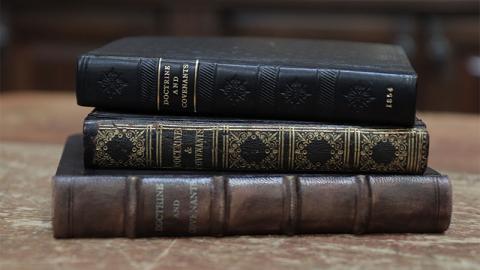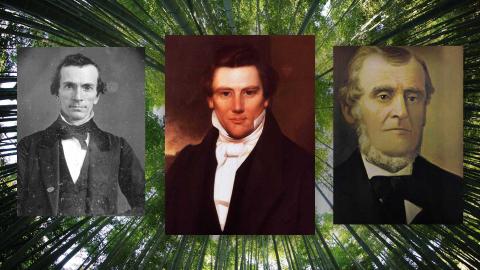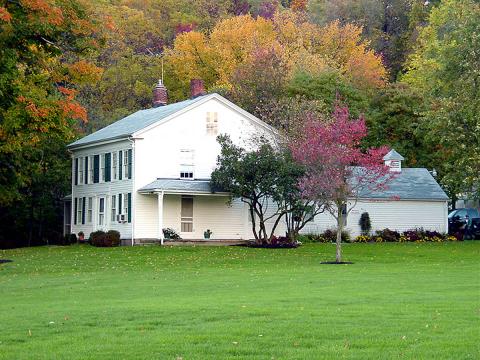You are here
Book of Mormon Central is in the process of migrating to our new Scripture Central website.
We ask for your patience during this transition. Over the coming weeks, all pages of bookofmormoncentral.org will be redirected to their corresponding page on scripturecentral.org, resulting in minimal disruption.

D&C 63
New from BMC
Watch videos from Gospel scholars and teachers to learn more about these sections of the Doctrine and Covenants. Book of Mormon Central produces weekly videos from Tyler Griffin, Taylor Halverson, John Hilton III, Anthony Sweat, Casey Griffiths, Stephanie Dibb Sorensen and Marianna Richardson. Read commentaries and other resources from KnoWhys, Steven C. Harper, Casey Griffiths, and Susan Easton Black.
Overview
Doctrine and Covenants 63
Daily Reading Plan
Structure your personal scripture study by following a 15-minute, day-by-day plan. Each day's assignment includes the required scripture passages from the Come, Follow Me curriculum, as well as suggestions for additional resources to bring context and understanding to your study. For the best experience, use our Reading Plan in the free ScripturePlus app! You can track your progress and have access to the best resources.
Monday
- Commentary: Section 63 Context, Steven C. Harper
- Scripture: D&C 63:1–11
-
Quote: It was not intended that we make merchandise out of the gifts of God and shout to the world the result of these most wonderful gifts. They are given to us for our salvation, to strengthen our testimony and the testimonies of others as we bear humble witness of them in our meetings, quietly, by the Spirit but not before the world.
James A. Cullimore, “Gifts of the Spirit,” October 1974 General Conference. - Commentary: Casey Paul Griffiths, Doctrine and Covenants Minute, Doctrine and Covenants 63:1–6.
- Commentary: Casey Paul Griffiths, Doctrine and Covenants Minute, Doctrine and Covenants 63:7–12.
Tuesday
- Scripture: D&C 63:12–22
- Commentary: Casey Paul Griffiths, Doctrine and Covenants Minute, Doctrine and Covenants 63:13–16.
- Commentary: Casey Paul Griffiths, Doctrine and Covenants Minute, Doctrine and Covenants 63:17–19.
- Commentary: Casey Paul Griffiths, Doctrine and Covenants Minute, Doctrine and Covenants 63:20.
- Commentary: Casey Paul Griffiths, Doctrine and Covenants Minute, Doctrine and Covenants 63:21.
Wednesday
- Scripture: D&C 63:23–31
- Commentary: Casey Paul Griffiths, Doctrine and Covenants Minute, Doctrine and Covenants 63:22–23.
- Commentary: Casey Paul Griffiths, Doctrine and Covenants Minute, Doctrine and Covenants 63:24–31.
-
Quote: By living the gospel of Jesus Christ, we develop within ourselves a living spring that will quench eternally our thirst for happiness, peace, and everlasting life. The Lord explains clearly in the Doctrine and Covenants that only faithful obedience can tap the well of living water that refreshes and enlivens our souls: “But unto him that keepeth my commandments I will give the mysteries of my kingdom, and the same shall be in him a well of living water, springing up unto everlasting life” (D&C 63:23).
Joseph B. Wirthlin, “Living Water to Quench Spiritual Thirst,” April 1995 General Conference. - Video: Transfiguration - Casey Griffiths (D&C 63)
Thursday
- Scripture: D&C 63:32–40
- Bio: Titus Billings, Susan Easton Black
- Commentary: Casey Paul Griffiths, Doctrine and Covenants Minute, Doctrine and Covenants 63:32–37.
-
Quote: The world is in a serious condition, but we need have no fear if we do what the Lord has asked us to do. This is His world. All men and women are subject to Him. All the powers of evil will be controlled for the sake of His people, if they will honor Him and keep His commandments; He has told us that in the latter days conditions would be such that people will be in fear and doubt. He has told us that the time would come when the elements would not only threaten but also that men would hate one another and seek to destroy one another and that the wicked should slay the wicked (D&C 63:33). When we see the condition that is in the world today, how grateful we ought to be that our forebears were called from the midst of the nations and guided into the gathering place of the Saints in the tops of these everlasting hills. We should prepare to send forth sons and daughters, keeping the commandments of God, to preside in the various departments of the Church, not only in the organized stakes, but as missionaries in many parts of the world where stakes are not yet organized.
The missionaries of this Church should be as a light set upon a hill wherever they go, and they will be if they keep the commandments of the Lord. They will be able to teach the truth if they are worthy of the companionship of that sweet spirit that comes from our Heavenly Father.
Upon us who remain at home, those that are holding positions among the organized stakes of Zion, who have been called to teach and guide not only by precept but by example, upon us devolves a responsibility that our Heavenly Father will hold us accountable for, and if we will but do our best, He will bless us in it.
No matter whether the clouds may gather, no matter how the war drums may beat, no matter what conditions may arise in the world, here in the Church of Jesus Christ of Latter-day Saints, wherever we are honoring and keeping the commandments of God, there will be protection from the powers of evil, and men and women will be permitted to live upon the earth until their lives are finished in honor and glory if they will keep the commandments of our Heavenly Father.
George Albert Smith, “Upholding the Hands of Our Leaders,” April 1942 General Conference.
Friday
- Scripture: D&C 63:41–48
- Commentary: Casey Paul Griffiths, Doctrine and Covenants Minute, Doctrine and Covenants 63:38–48.
- Bio: Newel K. Whitney, Susan Easton Black
- Video: Willing Hearts - John Hilton III (D&C 63)
Saturday
- Scripture: D&C 63:49–58
- Commentary: Casey Paul Griffiths, Doctrine and Covenants Minute, Doctrine and Covenants 63:49–54.
- Commentary: Casey Paul Griffiths, Doctrine and Covenants Minute, Doctrine and Covenants 63:55–58.
-
Quote: Would there be some members of the Church foolish enough to refuse to go to the temple because they did not want to wear garments for the short space of life in mortality? If there are members of the kingdom of God so unwise, certainly we would say, such a choice would be a very foolish one, indeed. Or would there be some among us who would refuse to pay tithing and fast offerings to the Lord, who would disregard God’s law of health by breaking the Word of Wisdom, who would defile their bodies by not observing the law of chastity, or break God’s other commandments and thereby cut themselves off from the blessings of the priesthood, from the blessings of the temple, and ultimately from exaltation? The truth remains that there are such unwise people who hold membership in the Church. At the coming of the Lord, if they fail to repent, they shall be counted among the “foolish virgins” (see D&C 45:56; D&C 63:54)
“For what is a man profited, if he shall gain the whole world, and lose his own soul? or what shall a man give in exchange for his soul?” (Matthew 16:26).
Certainly, as Latter-day Saints, we would have no profit if we should gain the whole world and lose our souls. There is nothing that this world can offer that we would exchange for eternal life.
Milton R. Hunter, “Selling Our Souls,” October 1953 General Conference.
Sunday
- Scripture: D&C 63:59–66
- Commentary: Casey Paul Griffiths, Doctrine and Covenants Minute, Doctrine and Covenants 63:59–64.
- Commentary: Casey Paul Griffiths, Doctrine and Covenants Minute, Doctrine and Covenants 63:65–66.
-
Quote: This scripture shows that we take the name of the Lord in vain when we use his name without authority. This obviously occurs when the sacred names of God the Father and his Son, Jesus Christ, are used in what is called profanity: in hateful cursings, in angry denunciations, or as marks of punctuation in common discourse.
The names of the Father and the Son are used with authority when we reverently teach and testify of them, when we pray, and when we perform the sacred ordinances of the priesthood.
There are no more sacred or significant words in all of our language than the names of God the Father and his Son, Jesus Christ.
Dallin H. Oaks, “Reverent and Clean,” April 1986 General Conference. -
Quote: With respect to that which we receive by the Spirit, the Lord said, “Remember that that which cometh from above is sacred” (D&C 63:64). His statement is more than a reminder; it is also a definition and an explanation. Light and knowledge from heaven is sacred. It is sacred because heaven is its source.
Sacred means worthy of veneration and respect. By designating something as sacred, the Lord signals that it is of higher value and priority than other things. Sacred things are to be treated with more care, given greater deference, and regarded with deeper reverence. Sacred ranks high in the hierarchy of heavenly values.
That which is sacred to God becomes sacred to us only through the exercise of agency; each must choose to accept and hold sacred that which God has defined as sacred. He sends light and knowledge from heaven. He invites us to receive and treat it as sacred.
Paul B. Pieper, “To Hold Sacred,” April 2012 General Conference.
Bibliography
Doctrine and Covenants 63
Steven C. Harper, “Section 63,” Doctrine and Covenants Contexts (Springville, UT: Book of Mormon Central, 2021), 145–146.
Susan Easton Black, “Stand in Holy Places - Insight Into D&C 63,” Restoration Voices Volume 2: People of the Doctrine and Covenants (Springville, UT: Book of Mormon Central, 2021).
Matthew McBride, “Ezra Booth and Isaac Morley,” Revelations in Context: The Stories Behind the Sections of the Doctrine and Covenants. Salt Lake City, UT: The Church of Jesus Christ of Latter-day Saints, 2016.
“Consecration and Stewardship,” Church History Topics.
“The Gathering of Israel,” Church History Topics.
Steven C. Harper, “’That They Might Come to Understanding’: Revelation as Process,” in You Shall Have My Word: Exploring the Text of the Doctrine and Covenants,eds. Scott C. Esplin, Richard O. Cowan, and Rachel Cope (Provo, UT: Religious Studies Center; Salt Lake City: Deseret Book, 2012), 19–33.
Matthew J. Grey, “’The Word of the Lord in the Original’: Joseph Smith's Study of Hebrew in Kirtland,” in Approaching Antiquity: Joseph Smith and the Ancient World, edited by Lincoln H. Blumell, Matthew J. Grey, and Andrew H. Hedges (Provo, UT: Religious Studies Center; Salt Lake City: Deseret Book, 2015), 249–302.
D&C 63:17
Book of Mormon Central, “Why Does the Book of Mormon Warn that a Lake of Fire and Brimstone Awaits Sinners in the Afterlife? (2 Nephi 9:16),” KnoWhy 446 (July 3, 2018).
D&C 63:23
Book of Mormon Central, “Why Did Nephi Want to Know the Mysteries of God? (1 Nephi 2:16),” KnoWhy 442 (June 19, 2018).
Sharon Anderson, “From the Fountain,” in The Glory of the Son (Orem, UT: Time-Lines Etc., 2019), 90.
Sharon Anderson, “Moses in the Wilderness,” in The Glory of the Son (Orem, UT: Time-Lines Etc., 2019), 19.
D&C 63:24
Sharon Anderson, “Latter-day Gathering,” in The Glory of the Son (Orem, UT: Time-Lines Etc., 2019), 58.
D&C 63:39
Susan Easton Black, “Titus Billings,” Restoration Voices Volume 1: Insights and Stories of the Doctrine and Covenants (Springville, UT: Book of Mormon Central, 2021).
D&C 63:42
Susan Easton Black, “Newel K. Whitney,” Restoration Voices Volume 1: Insights and Stories of the Doctrine and Covenants (Springville, UT: Book of Mormon Central, 2021).
D&C 63:46
Susan Easton Black, “Oliver Cowdery,” Restoration Voices Volume 1: Insights and Stories of the Doctrine and Covenants (Springville, UT: Book of Mormon Central, 2021).
D&C 63:49–52
Book of Mormon Central, “What Does the Book of Mormon Teach Us about the Resurrection? (2 Nephi 9:6),” KnoWhy 511 (April 20, 2019).
D&C 63:54
Book of Mormon Central, “Why Do the Scriptures Compare Hell to an Unquenchable Fire? (Mosiah 2:38),” KnoWhy 81 (April 19, 2020).
D&C 63:55
Susan Easton Black, “Sidney Rigdon,” Restoration Voices Volume 1: Insights and Stories of the Doctrine and Covenants (Springville, UT: Book of Mormon Central, 2021).



















